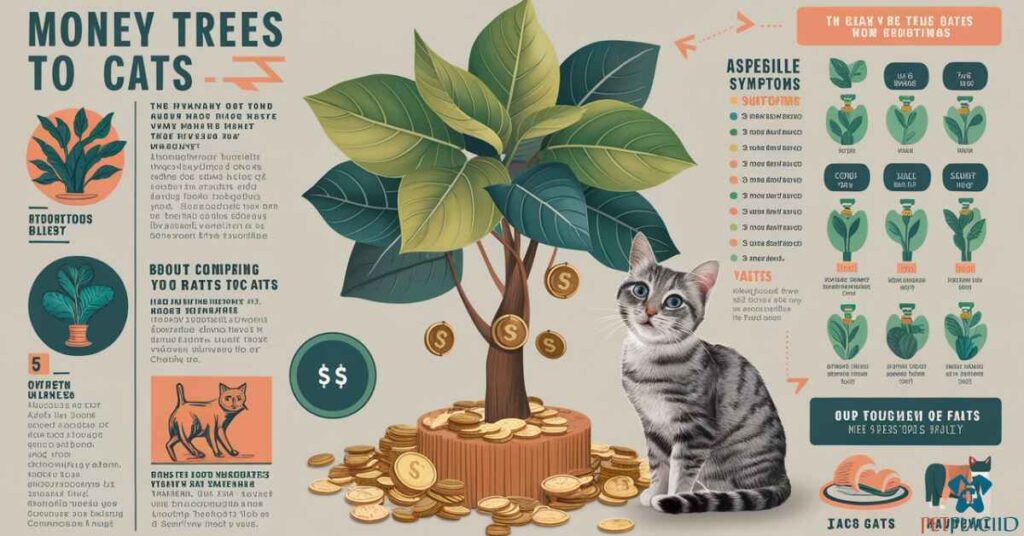According to recent surveys, nearly 1 in 3 cat owners in the USA and UK have a money tree (Pachira Aquatica) as an indoor houseplant. These striking tropical plants, with their braided trunks and lush greenery, have surged in popularity.
However, many pet parents worry about the potential toxicity risks to their feline friends. In this comprehensive guide, we’ll dive deep into answering the burning question: are money trees toxic to cats?
Are Money Trees Toxic to Cats?
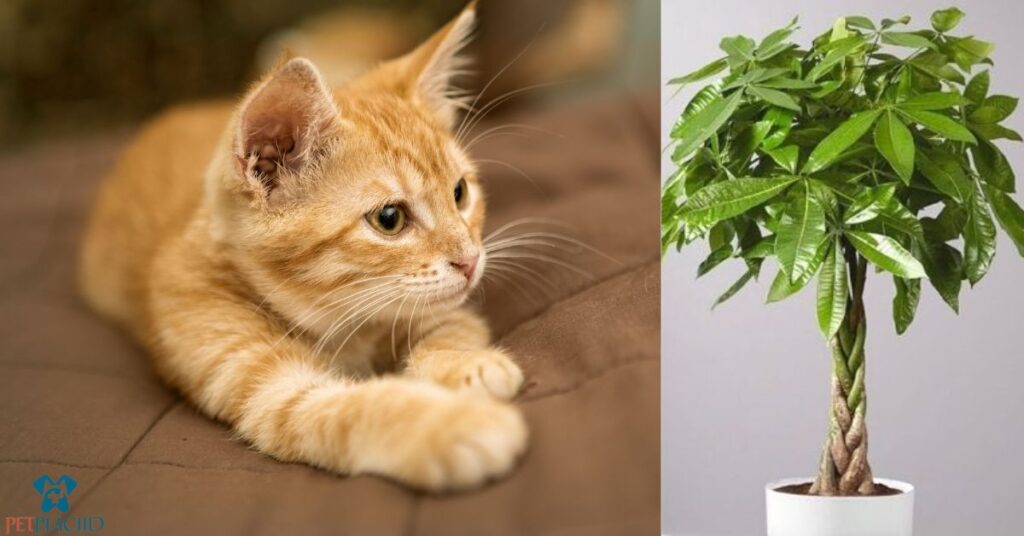
The good news is that money trees are considered non-toxic to cats, dogs, and horses according to the ASPCA. This means they don’t contain any substances that can cause serious harm or toxicity issues for our furry companions.
However, it’s important to note that while money trees pose a relatively low risk, no plant is entirely risk-free if ingested by curious cats. Chewing on the leaves or stems could potentially lead to mild gastrointestinal upset such as nausea, vomiting, or diarrhea.
These symptoms are typically short-lived and resolve on their own, but it’s still wise to monitor your cat closely after any plant consumption.
Despite their non-toxic status, responsible pet owners should take preventive measures to minimize the risk of ingestion and any potential discomfort for their cats. This includes ensuring the money tree isn’t treated with harmful pesticides or chemicals, and closely supervising interactions between your cat and the plant.
What is the Most Toxic Plant to Cats?
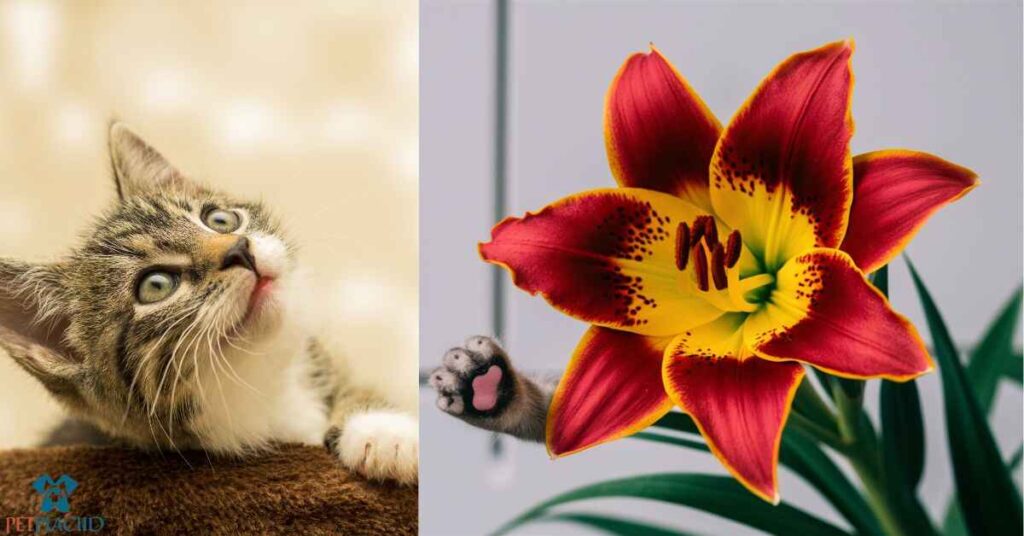
While money trees rank fairly low on the toxicity scale for cats, some common houseplants can be extremely dangerous if ingested. A few of the most toxic plants to cats include:
- Lilies: Highly toxic to cats, even small ingestions can cause kidney failure.
- Oleander: All parts are poisonous and can affect the gastrointestinal, nervous, and cardiovascular systems.
- Rhododendron: Ingestion can lead to vomiting, diarrhea, loss of appetite, and even paralysis.
In contrast to these highly toxic options, the relatively mild risk posed by money trees provides some reassurance for cautious cat owners looking to enjoy greenery safely in their homes.
| Plant | Toxicity Level | Common Symptoms |
| Lilies | Extremely High | Kidney failure |
| Oleander | Extremely High | GI, nervous, cardiovascular issues |
| Rhododendron | Extremely High | Vomiting, diarrhea, paralysis |
| Money Trees | Low | Mild GI upset |
Is a Dollar Tree Poisonous to Cats?
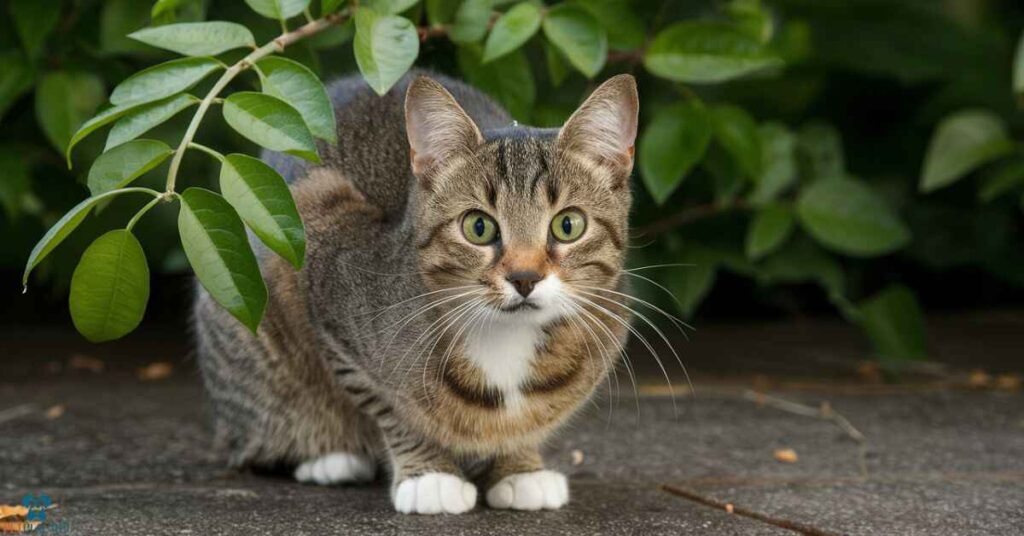
It’s important to clarify that “Dollar Tree” refers to the popular discount retail chain, not a type of plant. The money tree houseplant is scientifically known as Pachira Aquatica. While Dollar Tree products could potentially contain materials hazardous to pets if ingested, the store itself does not sell any plants called “dollar trees” that would be toxic to cats.
Do Cats Know Not to Eat Toxic Plants?
Despite their incredible instincts, cats do not inherently know which plants are toxic and which are safe to consume. Their natural curiosity and desire to chew or nibble can sometimes override any inherent caution.
“Cats lack the ability to identify toxic plants purely by scent or appearance. Their curiosity often gets the better of them.” – Dr. Sarah Wooten, DVM
As responsible pet owners, it falls on us to thoroughly research any new plants before introducing them to our homes with cats. Proper pet-proofing and supervision are crucial to preventing accidental ingestion of toxic greenery.
What Plants Do Cats Hate the Most?
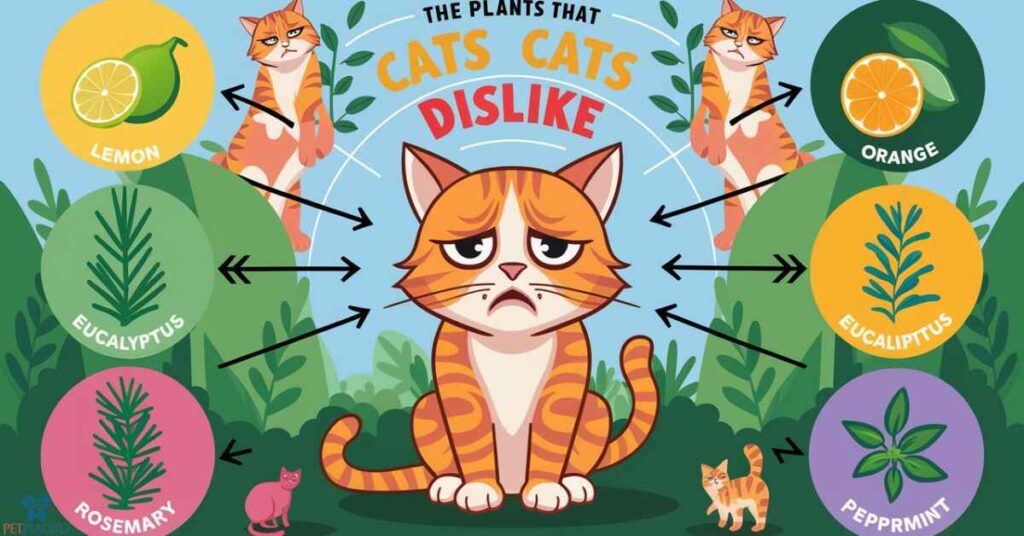
If you’re looking for cat-friendly alternatives or companion plants to deter your feline’s interest in your money tree, consider options with smells or textures that cats typically dislike. A few examples include:
- Citrus plants (lemon, lime, orange)
- Eucalyptus
- Pine
- Rosemary
- Lavender
- Peppermint
The strong aromas of these plants can be unpleasant for cats and may discourage them from chewing or scratching. Of course, you’ll still want to monitor any interactions closely.
Read More: Can Cats Taste Spicy? Risks of Feeding Spicy Foods to Cats
Why Cats Are Attracted to Money Trees?
Even though they are non-toxic, there are a few reasons why curious cats may be drawn to investigate and play with money trees:
- Playful Nature: The dangling leaves and braided trunk can mimic the visual stimuli cats crave for predatory play behaviors.
- Texture: Cats are attracted to different textures, and the braided trunk provides an enticing surface for scratching and climbing.
- Chewing Instinct: Younger cats especially may use houseplants like money trees to satisfy their urge to chew during the teething process.
While this behavior stems from natural instincts and curiosity rather than malice, providing enough mental and physical stimulation through toys, scratchers, and playtime can help curb destructive tendencies towards your plants.
Frequently Asked Questions (F.A.Q)
What should I do if my cat eats part of a money tree?
Try not to panic. Monitor your cat closely for any signs of stomach upset like vomiting or diarrhea. In most cases, symptoms will be mild and resolve within a day. However, if you notice prolonged discomfort or concerning symptoms, it’s always best to consult your veterinarian right away.
Are there other common houseplants that are toxic to cats?
Yes, some popular yet toxic houseplants include lilies, azaleas, and sago palms. Before adding any new plant to your home, research its potential toxicity or consult with your vet or a pet poison helpline to ensure it’s safe for cats.
How can I keep my cat entertained and away from houseplants?
The best way is to provide plenty of appropriate outlets for your cat’s instinctual behaviors. Offer interactive toys, scratching posts, cat grass, and catnip to keep them stimulated. You can also create a designated “cat garden” with safe, chewable plants like cat grass or wheat grass to satisfy the urge.
Final Thoughts
While money trees (Pachira Aquatica) are not considered toxic to cats according to the ASPCA, taking some basic precautions as a pet owner is still advisable. Monitor any nibbling, as ingestion could potentially lead to mild and temporary gastrointestinal upset. Ensure the plant is free of harmful chemicals, provide ample toys and scratchers as alternatives, and supervise closely during interactions.
With a little preparation and care, you can feel confident enjoying the unique beauty of these lush indoor houseplants alongside your feline family members safely. As Sandy Gain emphasized in her March 15, 2024 article, “The coexistence between your pet and your money tree can be harmonious and safe.”

Jackson is a seasoned professional in the field of pets, boasting four years of enriching experience. His expertise spans pet care, training, and health, ensuring insightful and reliable content for pet enthusiasts on our site.

